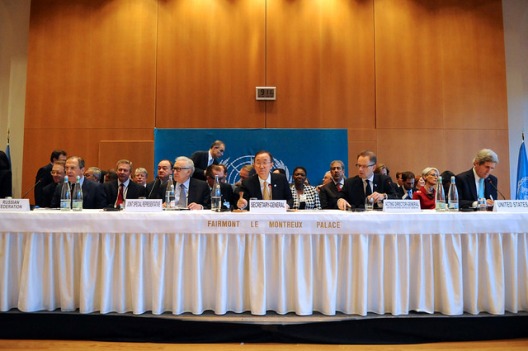
Thanks in part to a long, repetitive, rambling, and vitriolic statement by the representative of the Syrian government at the opening of the Geneva II peace conference in Montreux, Syria’s opposition made a good start toward achieving one of its goals: to be regarded by the international community as a serious, worthy, and relevant interlocutor. Although Ahmad Jarba, President of the Syrian National Coalition, pulled no punches in describing Geneva II as step one in bringing Bashar al-Assad to justice, he spoke in sober, professional tones. His opposite number, Foreign Minister Walid Muallem, employed invective, assigning to others—especially the Saudis and Turks—full responsibility for Syria’s travails. Still, the combined effect of Muallem’s histrionics and the carefully measured tones of Russian Foreign Minister Sergei Lavrov was to confirm conventional thinking: the prospect for Geneva II accomplishing its mission of launching political transition in Syria is, for the near-term, nil.
Many of the day’s speakers, beginning with United Nations Secretary-General Ban Ki-moon, accurately described Geneva II’s mission as one of implementing the Geneva I Final Communiqué of June 30, 2012, particularly with respect to the creation, on the basis of mutual consent, of a transitional governing body exercising full executive power consistent with human rights standards. Indeed, the transitional governing body is the essence of Geneva I.
Secretary of State John Kerry argued forcefully that the mutual consent clause all-but-eliminates Bashar al-Assad from a role in Syria’s transitional governance. The opposition, after all, would have to consent to the presence of someone it deems a defendant-in-waiting. Lavrov, on the other hand, could not bring himself to mouth the words “transitional governing body.” He defined mutual consent as two parties agreeing to a political settlement, removing the phrase from its Geneva I context altogether. Muallem was wholly dismissive of the notion that the power transfer mandate of Geneva I applied at all to Syria. Yet between Muallem’s crudity and Lavrov’s politesse the central point was made: no one should expect the near-term accomplishment of Geneva II’s mission.
Indeed, with Bashar al-Assad riding Iranian-provided foreign fighters and Russian arms to a stable position in western Syria, no one should expect him to authorize his delegates to negotiate the terms of his privatization. For that to happen his calculation would have to change.
John Kerry told the press after the opening plenary that he thought diplomatic pressure could change Assad’s mind, alluding to a conversation between Presidents Barack Obama and Vladimir Putin. Then, after mentioning aid to the opposition, he asserted that the threat of military force was still “on the table;” that it had never been removed by President Obama. If true, it will be welcome news to millions of Syrians bearing the brunt of serial atrocities resulting from Assad’s current calculation, which includes the notion of a free pass courtesy of the chemical weapons agreement. If true, Syrians may now speculate about the size of the abomination that would inspire the administration to act militarily to save lives. Since September 2013 they have assumed that there is literally nothing that would prompt the United States to neutralize the artillery, aircraft, rockets, and missiles that terrorize them, an impression recently strengthened by President Obama’s words in The New Yorker. Mr. Kerry has set the record straight.
Indeed, John Kerry’s powerful statement to the assembled foreign ministers was unadulterated good news for the opposition. Absent from it was any sense that the United States was coming to Geneva II with the attitude of a disinterested, even-handed purveyor of neutral good offices. The United States and the Syrian National Coalition share a literalist reading of Geneva I. There is no reason for either party to stray from that reading or from the position that political transition is the subject matter of Geneva II, for it reflects in full what the P5 agreed on in Geneva in June 2012. All the Russians wanted then was no explicit mention of Assad and no reference to people with blood on their hands, a phrase Russian negotiators accurately argued would be read by all as a synonym for Bashar al-Assad. Russian revisionism took hold only after Assad reportedly complained that Moscow was betraying him.
If Russia is back in the P5 fold on the matter of the transitional governing body and the clauses related to mutual consent and full executive power, it was not evident from Mr. Lavrov’s statement. Yet Mr. Kerry continues to imply that there is a convergence of Russian and US views. One hopes that US-Russian agreement over Bashar al-Assad’s expiring shelf life is on the table, along with an unexpired US military option. In any event, Kerry’s statement was strong, straightforward, and blunt: reminiscent of his clarion call for action in the immediate wake of the August 21, 2013 chemical atrocity.
Next steps for Geneva II include separate consultations with each of the Syrian parties by Special Representative Lakhdar Brahimi, followed by a planned meeting of the parties together with Brahimi on January 24. Then there may be a break of a week to ten days. During that time there will be an opportunity for Iran and Russia to rein-in their client, whose artillery and aerial assaults on residential neighborhoods continued even as his foreign minister feigned victimization in Montreux. Near-term transition from abusive clan rule to Syrian self-government clearly is not on. The prospect, however, for civil discussions setting the stage for Geneva II’s mission to be accomplished in a mutually consensual manner depends on two things: a humanitarian truce that yields full access for United Nations relief agencies; and a decision by the Assad regime to accept the mandate of Geneva I. At the moment, Bashar al-Assad is disinclined to do either. He has made his calculation.
Frederic C. Hof is a senior fellow with the Atlantic Council’s Rafik Hariri Center for the Middle East.
Image: (Photo: US Mission in Geneva/Flickr)
